Organisational Behaviour: Charismatic vs Transformational Leadership
VerifiedAdded on 2023/06/18
|13
|2674
|114
Essay
AI Summary
This essay provides a comprehensive analysis of leadership theories, focusing on transformational and charismatic leadership within organizational behavior. It explores the core characteristics of each style, highlighting their similarities and differences, particularly in motivating and influencing employees. The essay also delves into various sources of power that leaders can leverage, such as legitimate, reward, referent, informational, expert, and coercive power, examining their impact on employee performance and organizational dynamics within the context of Tesco plc. The report concludes by emphasizing the importance of understanding employee behavior and creating a supportive work environment to achieve desired organizational outcomes, further suggesting that reward power is an appropriate method for Tesco Plc as it will increase motivational level.
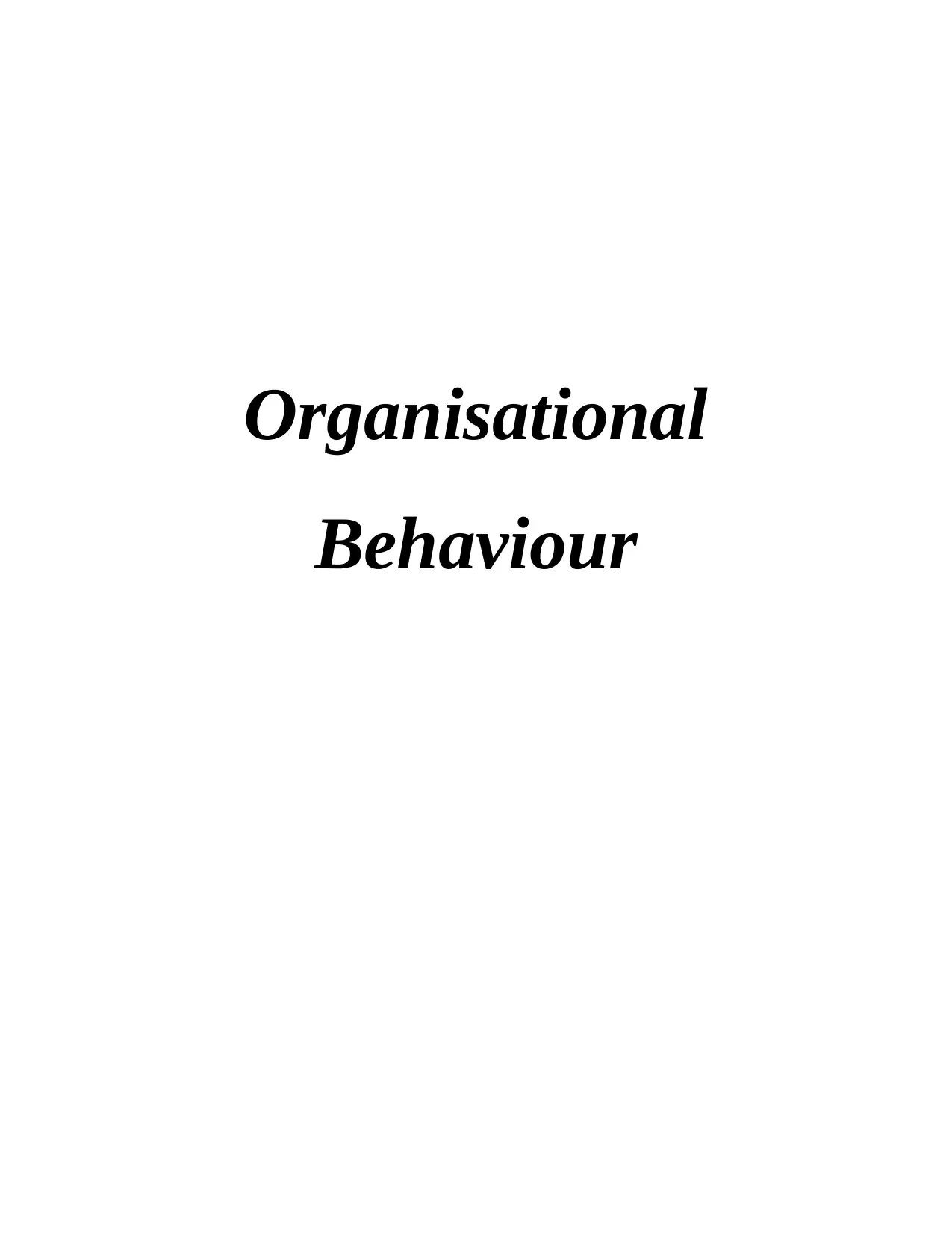
Organisational
Behaviour
Behaviour
Paraphrase This Document
Need a fresh take? Get an instant paraphrase of this document with our AI Paraphraser
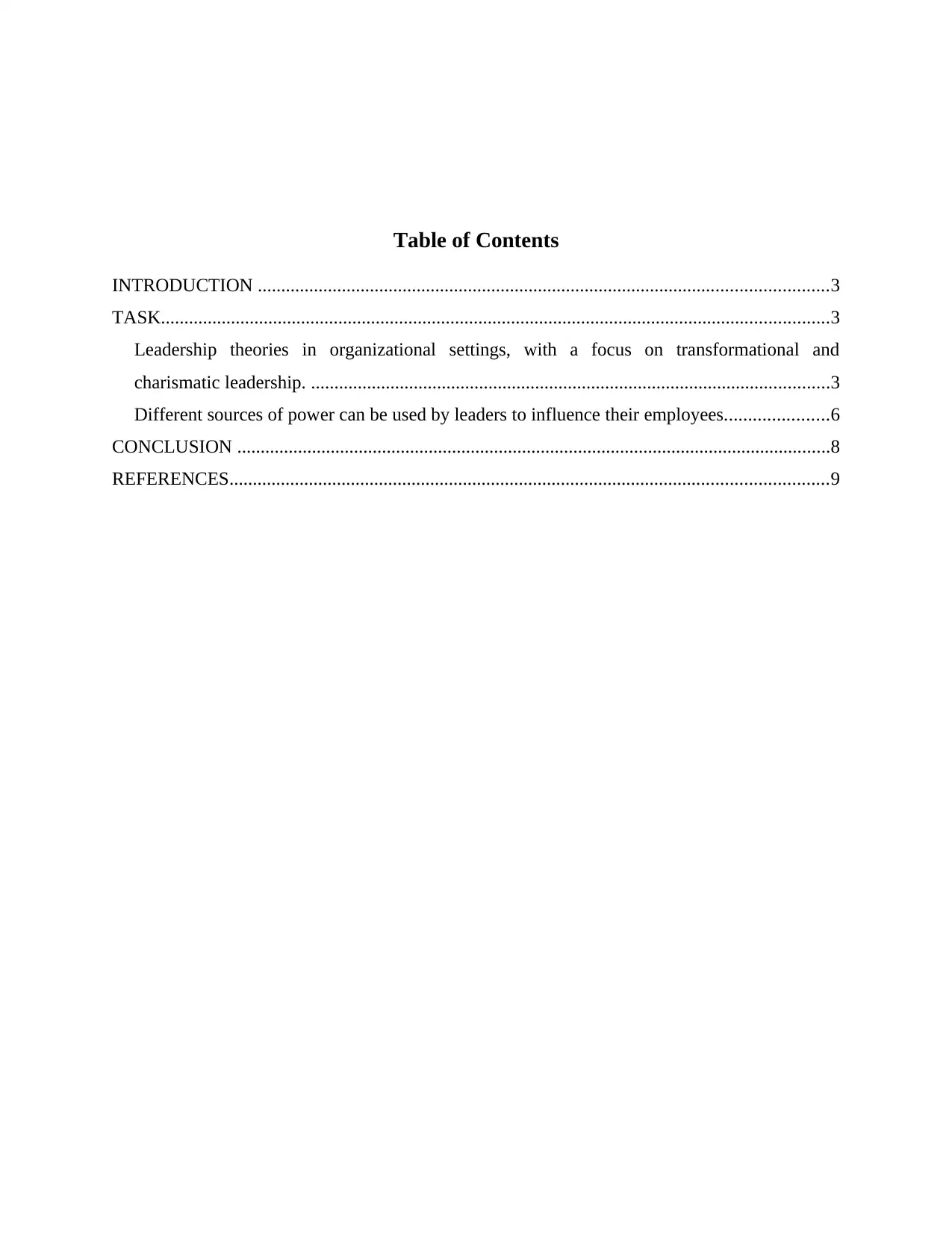
Table of Contents
INTRODUCTION ..........................................................................................................................3
TASK...............................................................................................................................................3
Leadership theories in organizational settings, with a focus on transformational and
charismatic leadership. ...............................................................................................................3
Different sources of power can be used by leaders to influence their employees......................6
CONCLUSION ...............................................................................................................................8
REFERENCES................................................................................................................................9
INTRODUCTION ..........................................................................................................................3
TASK...............................................................................................................................................3
Leadership theories in organizational settings, with a focus on transformational and
charismatic leadership. ...............................................................................................................3
Different sources of power can be used by leaders to influence their employees......................6
CONCLUSION ...............................................................................................................................8
REFERENCES................................................................................................................................9
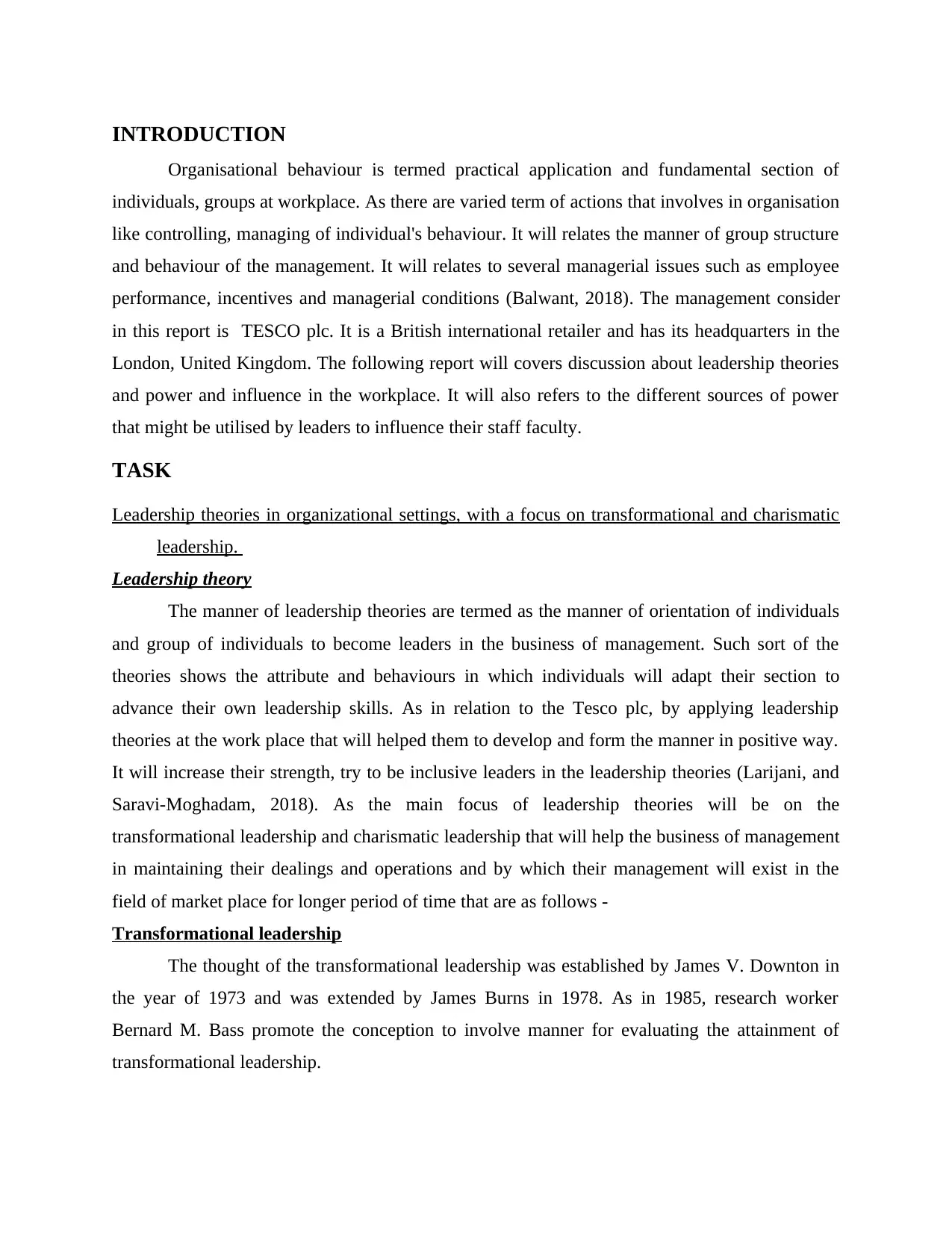
INTRODUCTION
Organisational behaviour is termed practical application and fundamental section of
individuals, groups at workplace. As there are varied term of actions that involves in organisation
like controlling, managing of individual's behaviour. It will relates the manner of group structure
and behaviour of the management. It will relates to several managerial issues such as employee
performance, incentives and managerial conditions (Balwant, 2018). The management consider
in this report is TESCO plc. It is a British international retailer and has its headquarters in the
London, United Kingdom. The following report will covers discussion about leadership theories
and power and influence in the workplace. It will also refers to the different sources of power
that might be utilised by leaders to influence their staff faculty.
TASK
Leadership theories in organizational settings, with a focus on transformational and charismatic
leadership.
Leadership theory
The manner of leadership theories are termed as the manner of orientation of individuals
and group of individuals to become leaders in the business of management. Such sort of the
theories shows the attribute and behaviours in which individuals will adapt their section to
advance their own leadership skills. As in relation to the Tesco plc, by applying leadership
theories at the work place that will helped them to develop and form the manner in positive way.
It will increase their strength, try to be inclusive leaders in the leadership theories (Larijani, and
Saravi-Moghadam, 2018). As the main focus of leadership theories will be on the
transformational leadership and charismatic leadership that will help the business of management
in maintaining their dealings and operations and by which their management will exist in the
field of market place for longer period of time that are as follows -
Transformational leadership
The thought of the transformational leadership was established by James V. Downton in
the year of 1973 and was extended by James Burns in 1978. As in 1985, research worker
Bernard M. Bass promote the conception to involve manner for evaluating the attainment of
transformational leadership.
Organisational behaviour is termed practical application and fundamental section of
individuals, groups at workplace. As there are varied term of actions that involves in organisation
like controlling, managing of individual's behaviour. It will relates the manner of group structure
and behaviour of the management. It will relates to several managerial issues such as employee
performance, incentives and managerial conditions (Balwant, 2018). The management consider
in this report is TESCO plc. It is a British international retailer and has its headquarters in the
London, United Kingdom. The following report will covers discussion about leadership theories
and power and influence in the workplace. It will also refers to the different sources of power
that might be utilised by leaders to influence their staff faculty.
TASK
Leadership theories in organizational settings, with a focus on transformational and charismatic
leadership.
Leadership theory
The manner of leadership theories are termed as the manner of orientation of individuals
and group of individuals to become leaders in the business of management. Such sort of the
theories shows the attribute and behaviours in which individuals will adapt their section to
advance their own leadership skills. As in relation to the Tesco plc, by applying leadership
theories at the work place that will helped them to develop and form the manner in positive way.
It will increase their strength, try to be inclusive leaders in the leadership theories (Larijani, and
Saravi-Moghadam, 2018). As the main focus of leadership theories will be on the
transformational leadership and charismatic leadership that will help the business of management
in maintaining their dealings and operations and by which their management will exist in the
field of market place for longer period of time that are as follows -
Transformational leadership
The thought of the transformational leadership was established by James V. Downton in
the year of 1973 and was extended by James Burns in 1978. As in 1985, research worker
Bernard M. Bass promote the conception to involve manner for evaluating the attainment of
transformational leadership.
⊘ This is a preview!⊘
Do you want full access?
Subscribe today to unlock all pages.

Trusted by 1+ million students worldwide
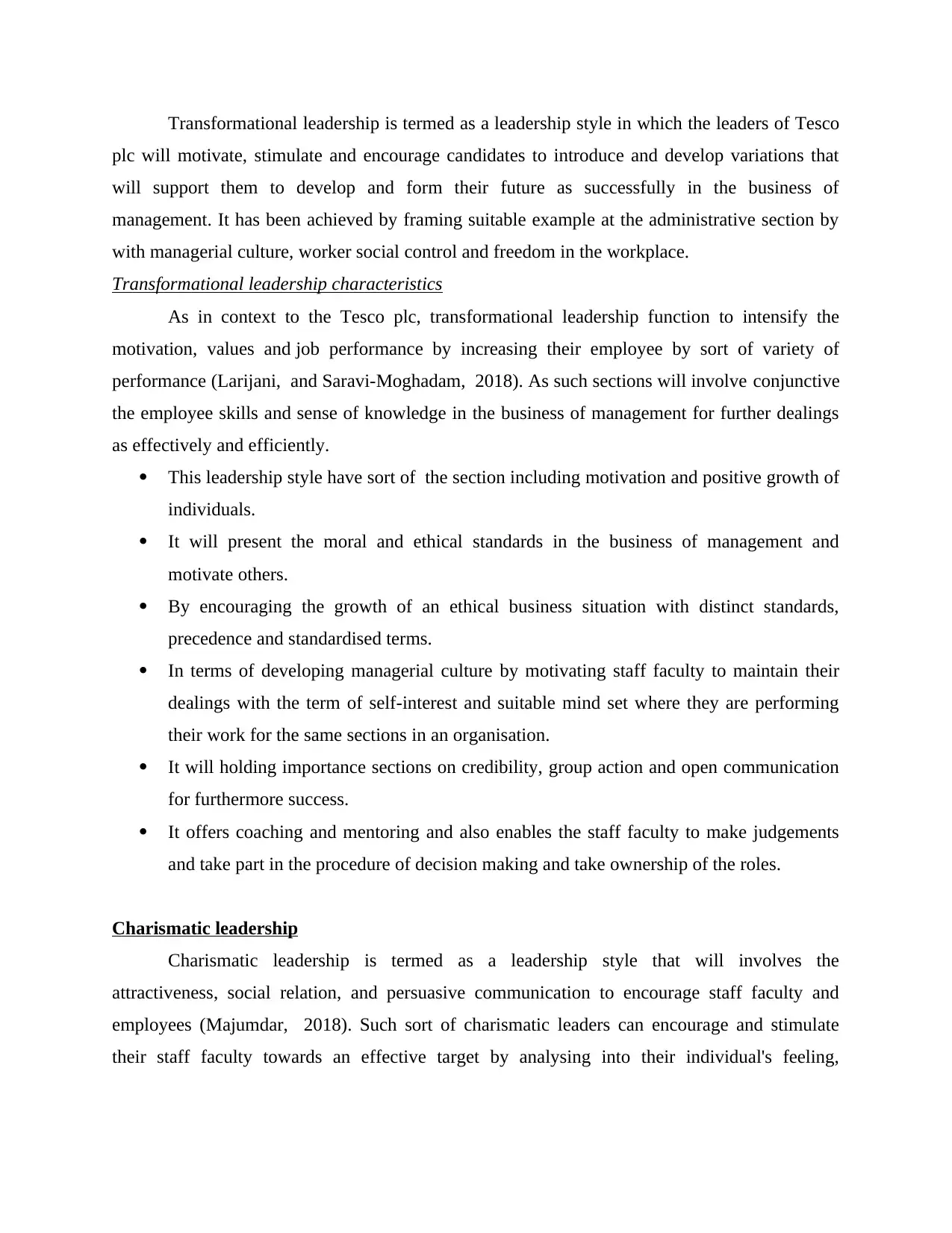
Transformational leadership is termed as a leadership style in which the leaders of Tesco
plc will motivate, stimulate and encourage candidates to introduce and develop variations that
will support them to develop and form their future as successfully in the business of
management. It has been achieved by framing suitable example at the administrative section by
with managerial culture, worker social control and freedom in the workplace.
Transformational leadership characteristics
As in context to the Tesco plc, transformational leadership function to intensify the
motivation, values and job performance by increasing their employee by sort of variety of
performance (Larijani, and Saravi-Moghadam, 2018). As such sections will involve conjunctive
the employee skills and sense of knowledge in the business of management for further dealings
as effectively and efficiently.
This leadership style have sort of the section including motivation and positive growth of
individuals.
It will present the moral and ethical standards in the business of management and
motivate others.
By encouraging the growth of an ethical business situation with distinct standards,
precedence and standardised terms.
In terms of developing managerial culture by motivating staff faculty to maintain their
dealings with the term of self-interest and suitable mind set where they are performing
their work for the same sections in an organisation.
It will holding importance sections on credibility, group action and open communication
for furthermore success.
It offers coaching and mentoring and also enables the staff faculty to make judgements
and take part in the procedure of decision making and take ownership of the roles.
Charismatic leadership
Charismatic leadership is termed as a leadership style that will involves the
attractiveness, social relation, and persuasive communication to encourage staff faculty and
employees (Majumdar, 2018). Such sort of charismatic leaders can encourage and stimulate
their staff faculty towards an effective target by analysing into their individual's feeling,
plc will motivate, stimulate and encourage candidates to introduce and develop variations that
will support them to develop and form their future as successfully in the business of
management. It has been achieved by framing suitable example at the administrative section by
with managerial culture, worker social control and freedom in the workplace.
Transformational leadership characteristics
As in context to the Tesco plc, transformational leadership function to intensify the
motivation, values and job performance by increasing their employee by sort of variety of
performance (Larijani, and Saravi-Moghadam, 2018). As such sections will involve conjunctive
the employee skills and sense of knowledge in the business of management for further dealings
as effectively and efficiently.
This leadership style have sort of the section including motivation and positive growth of
individuals.
It will present the moral and ethical standards in the business of management and
motivate others.
By encouraging the growth of an ethical business situation with distinct standards,
precedence and standardised terms.
In terms of developing managerial culture by motivating staff faculty to maintain their
dealings with the term of self-interest and suitable mind set where they are performing
their work for the same sections in an organisation.
It will holding importance sections on credibility, group action and open communication
for furthermore success.
It offers coaching and mentoring and also enables the staff faculty to make judgements
and take part in the procedure of decision making and take ownership of the roles.
Charismatic leadership
Charismatic leadership is termed as a leadership style that will involves the
attractiveness, social relation, and persuasive communication to encourage staff faculty and
employees (Majumdar, 2018). Such sort of charismatic leaders can encourage and stimulate
their staff faculty towards an effective target by analysing into their individual's feeling,
Paraphrase This Document
Need a fresh take? Get an instant paraphrase of this document with our AI Paraphraser
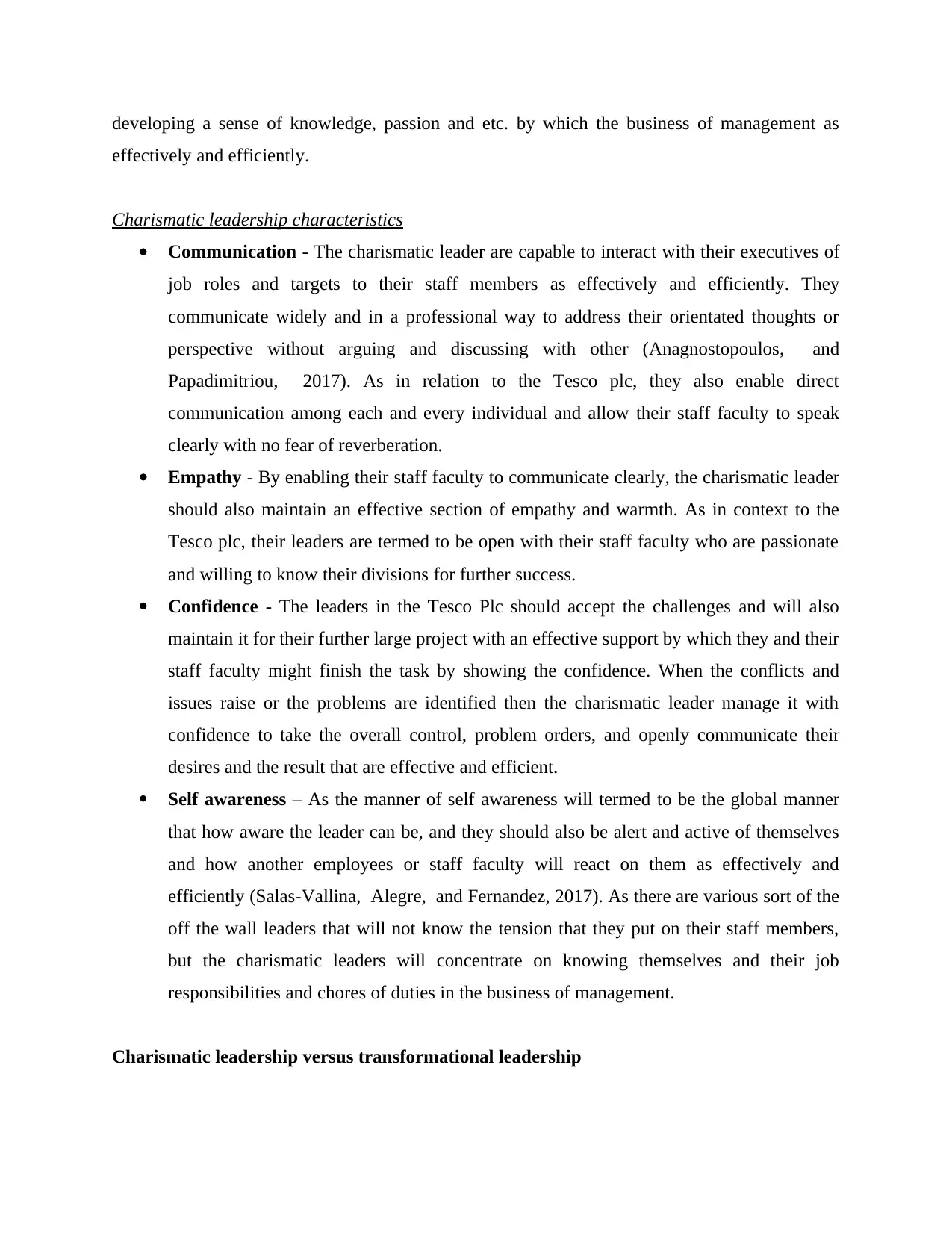
developing a sense of knowledge, passion and etc. by which the business of management as
effectively and efficiently.
Charismatic leadership characteristics
Communication - The charismatic leader are capable to interact with their executives of
job roles and targets to their staff members as effectively and efficiently. They
communicate widely and in a professional way to address their orientated thoughts or
perspective without arguing and discussing with other (Anagnostopoulos, and
Papadimitriou, 2017). As in relation to the Tesco plc, they also enable direct
communication among each and every individual and allow their staff faculty to speak
clearly with no fear of reverberation.
Empathy - By enabling their staff faculty to communicate clearly, the charismatic leader
should also maintain an effective section of empathy and warmth. As in context to the
Tesco plc, their leaders are termed to be open with their staff faculty who are passionate
and willing to know their divisions for further success.
Confidence - The leaders in the Tesco Plc should accept the challenges and will also
maintain it for their further large project with an effective support by which they and their
staff faculty might finish the task by showing the confidence. When the conflicts and
issues raise or the problems are identified then the charismatic leader manage it with
confidence to take the overall control, problem orders, and openly communicate their
desires and the result that are effective and efficient.
Self awareness – As the manner of self awareness will termed to be the global manner
that how aware the leader can be, and they should also be alert and active of themselves
and how another employees or staff faculty will react on them as effectively and
efficiently (Salas-Vallina, Alegre, and Fernandez, 2017). As there are various sort of the
off the wall leaders that will not know the tension that they put on their staff members,
but the charismatic leaders will concentrate on knowing themselves and their job
responsibilities and chores of duties in the business of management.
Charismatic leadership versus transformational leadership
effectively and efficiently.
Charismatic leadership characteristics
Communication - The charismatic leader are capable to interact with their executives of
job roles and targets to their staff members as effectively and efficiently. They
communicate widely and in a professional way to address their orientated thoughts or
perspective without arguing and discussing with other (Anagnostopoulos, and
Papadimitriou, 2017). As in relation to the Tesco plc, they also enable direct
communication among each and every individual and allow their staff faculty to speak
clearly with no fear of reverberation.
Empathy - By enabling their staff faculty to communicate clearly, the charismatic leader
should also maintain an effective section of empathy and warmth. As in context to the
Tesco plc, their leaders are termed to be open with their staff faculty who are passionate
and willing to know their divisions for further success.
Confidence - The leaders in the Tesco Plc should accept the challenges and will also
maintain it for their further large project with an effective support by which they and their
staff faculty might finish the task by showing the confidence. When the conflicts and
issues raise or the problems are identified then the charismatic leader manage it with
confidence to take the overall control, problem orders, and openly communicate their
desires and the result that are effective and efficient.
Self awareness – As the manner of self awareness will termed to be the global manner
that how aware the leader can be, and they should also be alert and active of themselves
and how another employees or staff faculty will react on them as effectively and
efficiently (Salas-Vallina, Alegre, and Fernandez, 2017). As there are various sort of the
off the wall leaders that will not know the tension that they put on their staff members,
but the charismatic leaders will concentrate on knowing themselves and their job
responsibilities and chores of duties in the business of management.
Charismatic leadership versus transformational leadership
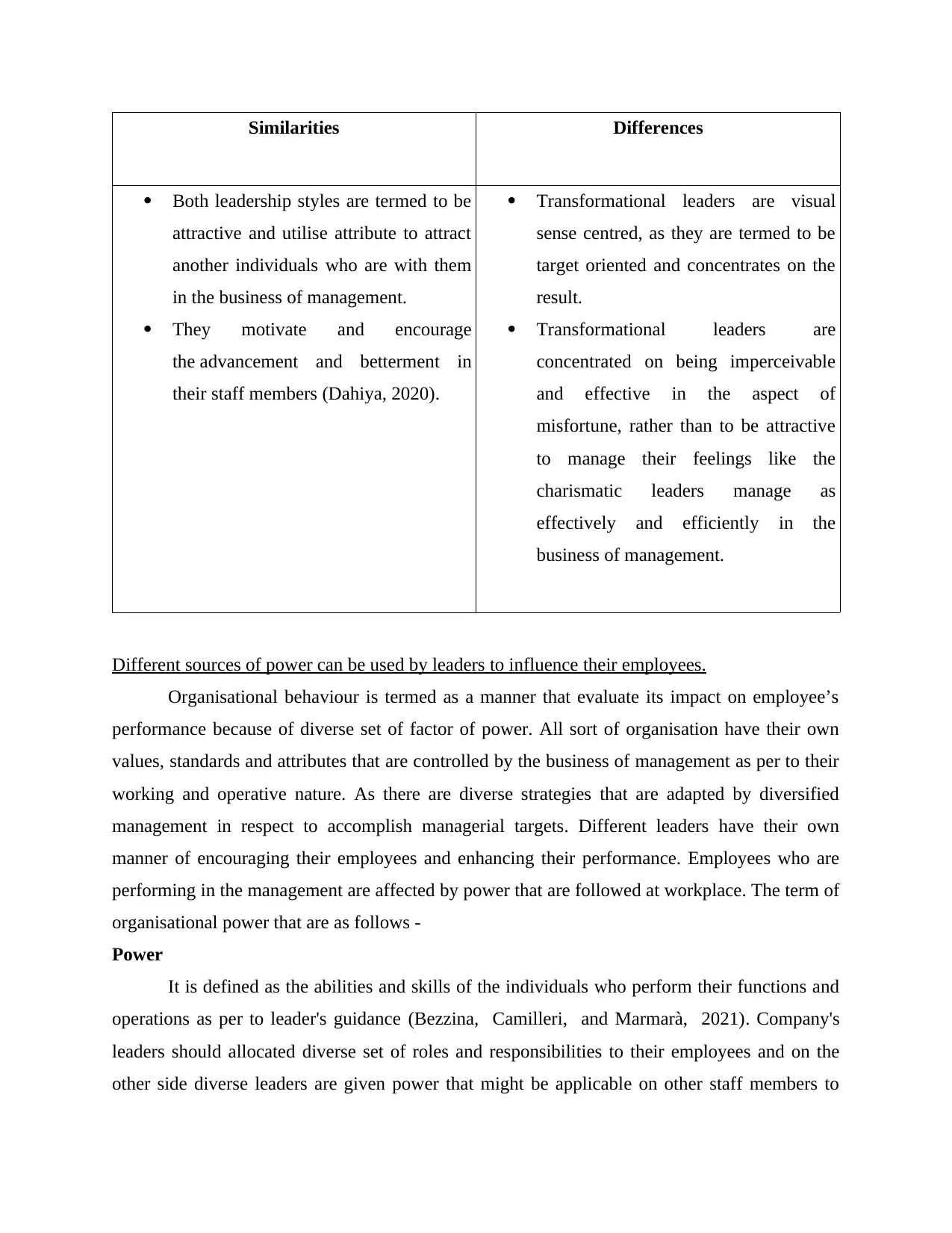
Similarities Differences
Both leadership styles are termed to be
attractive and utilise attribute to attract
another individuals who are with them
in the business of management.
They motivate and encourage
the advancement and betterment in
their staff members (Dahiya, 2020).
Transformational leaders are visual
sense centred, as they are termed to be
target oriented and concentrates on the
result.
Transformational leaders are
concentrated on being imperceivable
and effective in the aspect of
misfortune, rather than to be attractive
to manage their feelings like the
charismatic leaders manage as
effectively and efficiently in the
business of management.
Different sources of power can be used by leaders to influence their employees.
Organisational behaviour is termed as a manner that evaluate its impact on employee’s
performance because of diverse set of factor of power. All sort of organisation have their own
values, standards and attributes that are controlled by the business of management as per to their
working and operative nature. As there are diverse strategies that are adapted by diversified
management in respect to accomplish managerial targets. Different leaders have their own
manner of encouraging their employees and enhancing their performance. Employees who are
performing in the management are affected by power that are followed at workplace. The term of
organisational power that are as follows -
Power
It is defined as the abilities and skills of the individuals who perform their functions and
operations as per to leader's guidance (Bezzina, Camilleri, and Marmarà, 2021). Company's
leaders should allocated diverse set of roles and responsibilities to their employees and on the
other side diverse leaders are given power that might be applicable on other staff members to
Both leadership styles are termed to be
attractive and utilise attribute to attract
another individuals who are with them
in the business of management.
They motivate and encourage
the advancement and betterment in
their staff members (Dahiya, 2020).
Transformational leaders are visual
sense centred, as they are termed to be
target oriented and concentrates on the
result.
Transformational leaders are
concentrated on being imperceivable
and effective in the aspect of
misfortune, rather than to be attractive
to manage their feelings like the
charismatic leaders manage as
effectively and efficiently in the
business of management.
Different sources of power can be used by leaders to influence their employees.
Organisational behaviour is termed as a manner that evaluate its impact on employee’s
performance because of diverse set of factor of power. All sort of organisation have their own
values, standards and attributes that are controlled by the business of management as per to their
working and operative nature. As there are diverse strategies that are adapted by diversified
management in respect to accomplish managerial targets. Different leaders have their own
manner of encouraging their employees and enhancing their performance. Employees who are
performing in the management are affected by power that are followed at workplace. The term of
organisational power that are as follows -
Power
It is defined as the abilities and skills of the individuals who perform their functions and
operations as per to leader's guidance (Bezzina, Camilleri, and Marmarà, 2021). Company's
leaders should allocated diverse set of roles and responsibilities to their employees and on the
other side diverse leaders are given power that might be applicable on other staff members to
⊘ This is a preview!⊘
Do you want full access?
Subscribe today to unlock all pages.

Trusted by 1+ million students worldwide
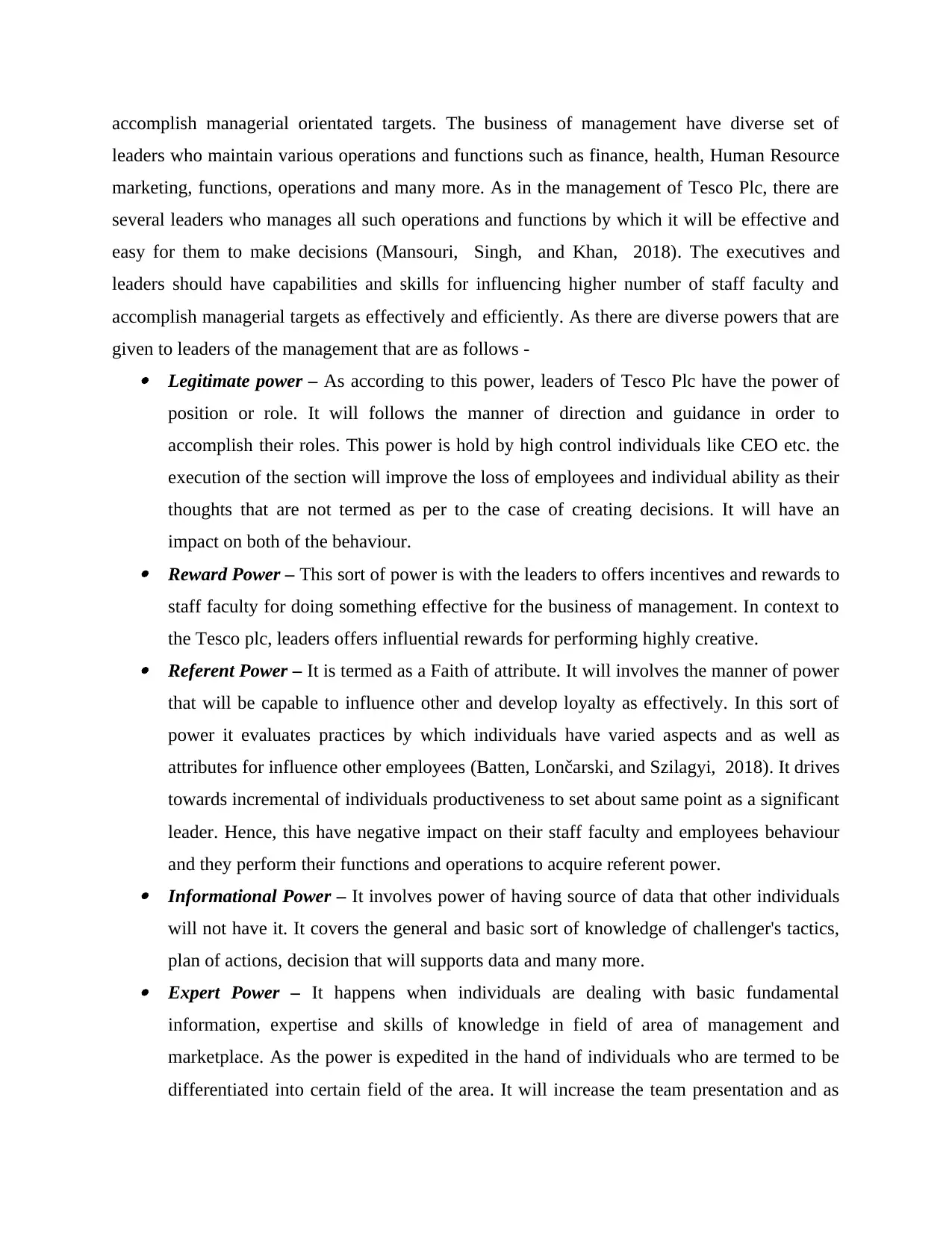
accomplish managerial orientated targets. The business of management have diverse set of
leaders who maintain various operations and functions such as finance, health, Human Resource
marketing, functions, operations and many more. As in the management of Tesco Plc, there are
several leaders who manages all such operations and functions by which it will be effective and
easy for them to make decisions (Mansouri, Singh, and Khan, 2018). The executives and
leaders should have capabilities and skills for influencing higher number of staff faculty and
accomplish managerial targets as effectively and efficiently. As there are diverse powers that are
given to leaders of the management that are as follows - Legitimate power – As according to this power, leaders of Tesco Plc have the power of
position or role. It will follows the manner of direction and guidance in order to
accomplish their roles. This power is hold by high control individuals like CEO etc. the
execution of the section will improve the loss of employees and individual ability as their
thoughts that are not termed as per to the case of creating decisions. It will have an
impact on both of the behaviour. Reward Power – This sort of power is with the leaders to offers incentives and rewards to
staff faculty for doing something effective for the business of management. In context to
the Tesco plc, leaders offers influential rewards for performing highly creative. Referent Power – It is termed as a Faith of attribute. It will involves the manner of power
that will be capable to influence other and develop loyalty as effectively. In this sort of
power it evaluates practices by which individuals have varied aspects and as well as
attributes for influence other employees (Batten, Lončarski, and Szilagyi, 2018). It drives
towards incremental of individuals productiveness to set about same point as a significant
leader. Hence, this have negative impact on their staff faculty and employees behaviour
and they perform their functions and operations to acquire referent power. Informational Power – It involves power of having source of data that other individuals
will not have it. It covers the general and basic sort of knowledge of challenger's tactics,
plan of actions, decision that will supports data and many more. Expert Power – It happens when individuals are dealing with basic fundamental
information, expertise and skills of knowledge in field of area of management and
marketplace. As the power is expedited in the hand of individuals who are termed to be
differentiated into certain field of the area. It will increase the team presentation and as
leaders who maintain various operations and functions such as finance, health, Human Resource
marketing, functions, operations and many more. As in the management of Tesco Plc, there are
several leaders who manages all such operations and functions by which it will be effective and
easy for them to make decisions (Mansouri, Singh, and Khan, 2018). The executives and
leaders should have capabilities and skills for influencing higher number of staff faculty and
accomplish managerial targets as effectively and efficiently. As there are diverse powers that are
given to leaders of the management that are as follows - Legitimate power – As according to this power, leaders of Tesco Plc have the power of
position or role. It will follows the manner of direction and guidance in order to
accomplish their roles. This power is hold by high control individuals like CEO etc. the
execution of the section will improve the loss of employees and individual ability as their
thoughts that are not termed as per to the case of creating decisions. It will have an
impact on both of the behaviour. Reward Power – This sort of power is with the leaders to offers incentives and rewards to
staff faculty for doing something effective for the business of management. In context to
the Tesco plc, leaders offers influential rewards for performing highly creative. Referent Power – It is termed as a Faith of attribute. It will involves the manner of power
that will be capable to influence other and develop loyalty as effectively. In this sort of
power it evaluates practices by which individuals have varied aspects and as well as
attributes for influence other employees (Batten, Lončarski, and Szilagyi, 2018). It drives
towards incremental of individuals productiveness to set about same point as a significant
leader. Hence, this have negative impact on their staff faculty and employees behaviour
and they perform their functions and operations to acquire referent power. Informational Power – It involves power of having source of data that other individuals
will not have it. It covers the general and basic sort of knowledge of challenger's tactics,
plan of actions, decision that will supports data and many more. Expert Power – It happens when individuals are dealing with basic fundamental
information, expertise and skills of knowledge in field of area of management and
marketplace. As the power is expedited in the hand of individuals who are termed to be
differentiated into certain field of the area. It will increase the team presentation and as
Paraphrase This Document
Need a fresh take? Get an instant paraphrase of this document with our AI Paraphraser
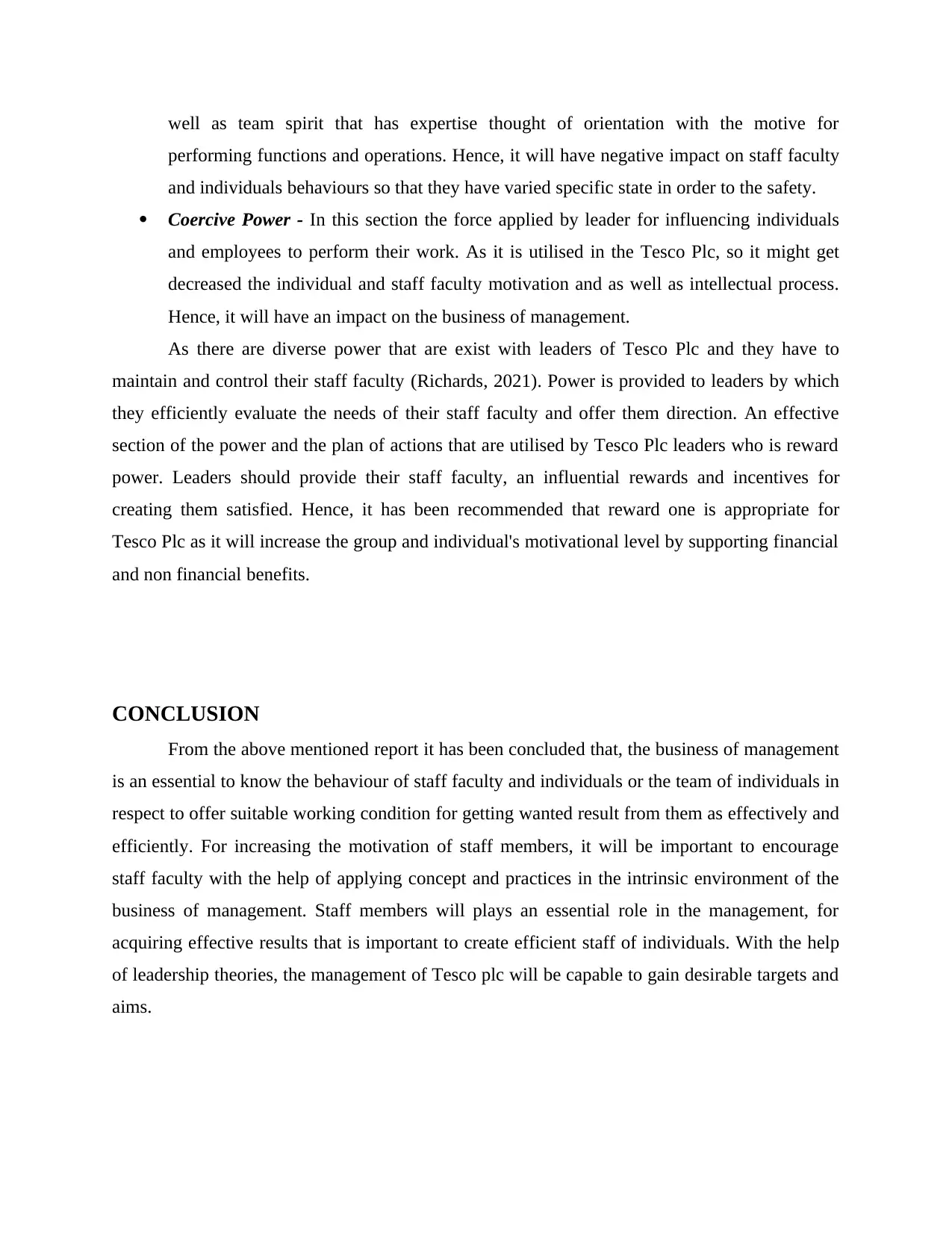
well as team spirit that has expertise thought of orientation with the motive for
performing functions and operations. Hence, it will have negative impact on staff faculty
and individuals behaviours so that they have varied specific state in order to the safety.
Coercive Power - In this section the force applied by leader for influencing individuals
and employees to perform their work. As it is utilised in the Tesco Plc, so it might get
decreased the individual and staff faculty motivation and as well as intellectual process.
Hence, it will have an impact on the business of management.
As there are diverse power that are exist with leaders of Tesco Plc and they have to
maintain and control their staff faculty (Richards, 2021). Power is provided to leaders by which
they efficiently evaluate the needs of their staff faculty and offer them direction. An effective
section of the power and the plan of actions that are utilised by Tesco Plc leaders who is reward
power. Leaders should provide their staff faculty, an influential rewards and incentives for
creating them satisfied. Hence, it has been recommended that reward one is appropriate for
Tesco Plc as it will increase the group and individual's motivational level by supporting financial
and non financial benefits.
CONCLUSION
From the above mentioned report it has been concluded that, the business of management
is an essential to know the behaviour of staff faculty and individuals or the team of individuals in
respect to offer suitable working condition for getting wanted result from them as effectively and
efficiently. For increasing the motivation of staff members, it will be important to encourage
staff faculty with the help of applying concept and practices in the intrinsic environment of the
business of management. Staff members will plays an essential role in the management, for
acquiring effective results that is important to create efficient staff of individuals. With the help
of leadership theories, the management of Tesco plc will be capable to gain desirable targets and
aims.
performing functions and operations. Hence, it will have negative impact on staff faculty
and individuals behaviours so that they have varied specific state in order to the safety.
Coercive Power - In this section the force applied by leader for influencing individuals
and employees to perform their work. As it is utilised in the Tesco Plc, so it might get
decreased the individual and staff faculty motivation and as well as intellectual process.
Hence, it will have an impact on the business of management.
As there are diverse power that are exist with leaders of Tesco Plc and they have to
maintain and control their staff faculty (Richards, 2021). Power is provided to leaders by which
they efficiently evaluate the needs of their staff faculty and offer them direction. An effective
section of the power and the plan of actions that are utilised by Tesco Plc leaders who is reward
power. Leaders should provide their staff faculty, an influential rewards and incentives for
creating them satisfied. Hence, it has been recommended that reward one is appropriate for
Tesco Plc as it will increase the group and individual's motivational level by supporting financial
and non financial benefits.
CONCLUSION
From the above mentioned report it has been concluded that, the business of management
is an essential to know the behaviour of staff faculty and individuals or the team of individuals in
respect to offer suitable working condition for getting wanted result from them as effectively and
efficiently. For increasing the motivation of staff members, it will be important to encourage
staff faculty with the help of applying concept and practices in the intrinsic environment of the
business of management. Staff members will plays an essential role in the management, for
acquiring effective results that is important to create efficient staff of individuals. With the help
of leadership theories, the management of Tesco plc will be capable to gain desirable targets and
aims.

⊘ This is a preview!⊘
Do you want full access?
Subscribe today to unlock all pages.

Trusted by 1+ million students worldwide
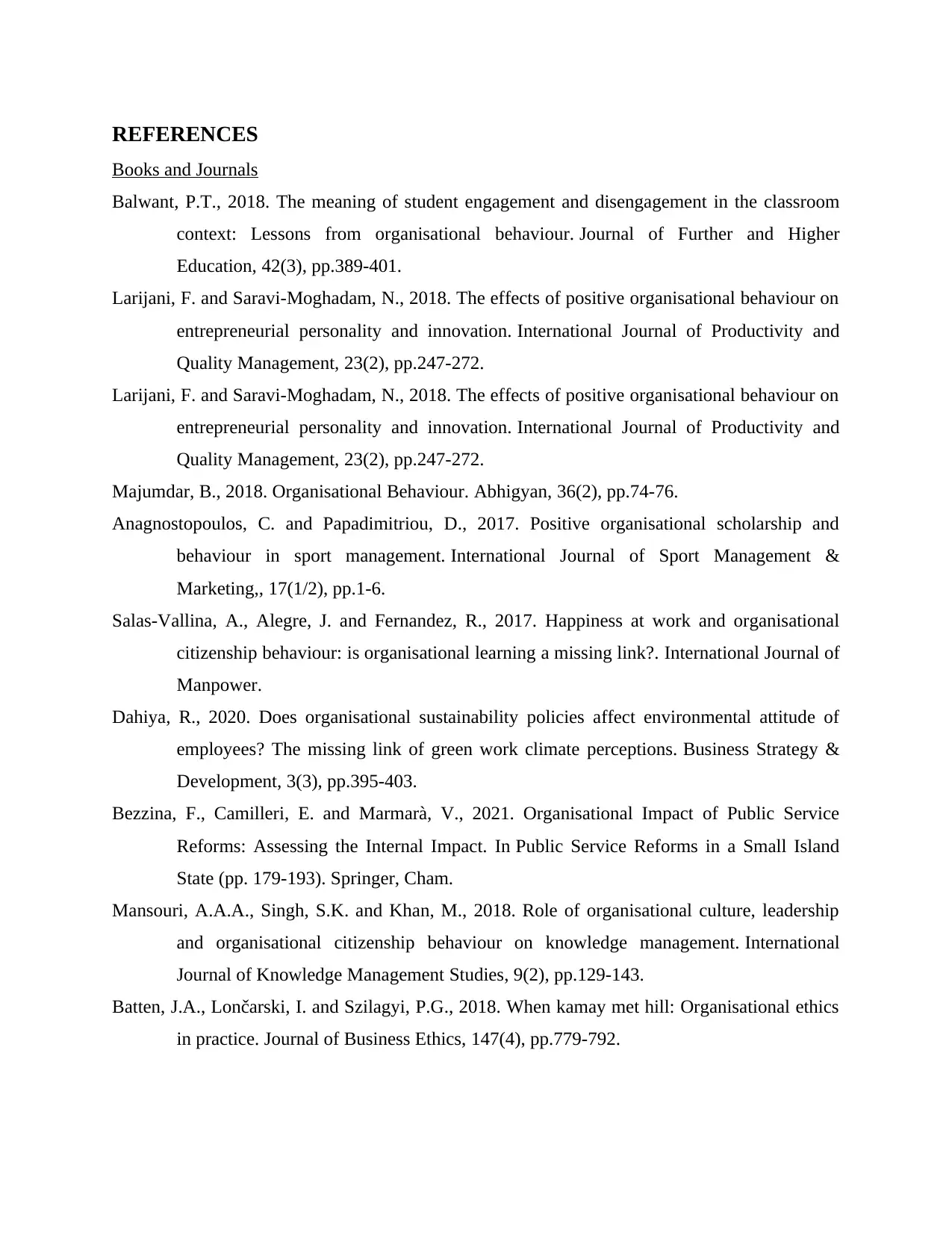
REFERENCES
Books and Journals
Balwant, P.T., 2018. The meaning of student engagement and disengagement in the classroom
context: Lessons from organisational behaviour. Journal of Further and Higher
Education, 42(3), pp.389-401.
Larijani, F. and Saravi-Moghadam, N., 2018. The effects of positive organisational behaviour on
entrepreneurial personality and innovation. International Journal of Productivity and
Quality Management, 23(2), pp.247-272.
Larijani, F. and Saravi-Moghadam, N., 2018. The effects of positive organisational behaviour on
entrepreneurial personality and innovation. International Journal of Productivity and
Quality Management, 23(2), pp.247-272.
Majumdar, B., 2018. Organisational Behaviour. Abhigyan, 36(2), pp.74-76.
Anagnostopoulos, C. and Papadimitriou, D., 2017. Positive organisational scholarship and
behaviour in sport management. International Journal of Sport Management &
Marketing,, 17(1/2), pp.1-6.
Salas-Vallina, A., Alegre, J. and Fernandez, R., 2017. Happiness at work and organisational
citizenship behaviour: is organisational learning a missing link?. International Journal of
Manpower.
Dahiya, R., 2020. Does organisational sustainability policies affect environmental attitude of
employees? The missing link of green work climate perceptions. Business Strategy &
Development, 3(3), pp.395-403.
Bezzina, F., Camilleri, E. and Marmarà, V., 2021. Organisational Impact of Public Service
Reforms: Assessing the Internal Impact. In Public Service Reforms in a Small Island
State (pp. 179-193). Springer, Cham.
Mansouri, A.A.A., Singh, S.K. and Khan, M., 2018. Role of organisational culture, leadership
and organisational citizenship behaviour on knowledge management. International
Journal of Knowledge Management Studies, 9(2), pp.129-143.
Batten, J.A., Lončarski, I. and Szilagyi, P.G., 2018. When kamay met hill: Organisational ethics
in practice. Journal of Business Ethics, 147(4), pp.779-792.
Books and Journals
Balwant, P.T., 2018. The meaning of student engagement and disengagement in the classroom
context: Lessons from organisational behaviour. Journal of Further and Higher
Education, 42(3), pp.389-401.
Larijani, F. and Saravi-Moghadam, N., 2018. The effects of positive organisational behaviour on
entrepreneurial personality and innovation. International Journal of Productivity and
Quality Management, 23(2), pp.247-272.
Larijani, F. and Saravi-Moghadam, N., 2018. The effects of positive organisational behaviour on
entrepreneurial personality and innovation. International Journal of Productivity and
Quality Management, 23(2), pp.247-272.
Majumdar, B., 2018. Organisational Behaviour. Abhigyan, 36(2), pp.74-76.
Anagnostopoulos, C. and Papadimitriou, D., 2017. Positive organisational scholarship and
behaviour in sport management. International Journal of Sport Management &
Marketing,, 17(1/2), pp.1-6.
Salas-Vallina, A., Alegre, J. and Fernandez, R., 2017. Happiness at work and organisational
citizenship behaviour: is organisational learning a missing link?. International Journal of
Manpower.
Dahiya, R., 2020. Does organisational sustainability policies affect environmental attitude of
employees? The missing link of green work climate perceptions. Business Strategy &
Development, 3(3), pp.395-403.
Bezzina, F., Camilleri, E. and Marmarà, V., 2021. Organisational Impact of Public Service
Reforms: Assessing the Internal Impact. In Public Service Reforms in a Small Island
State (pp. 179-193). Springer, Cham.
Mansouri, A.A.A., Singh, S.K. and Khan, M., 2018. Role of organisational culture, leadership
and organisational citizenship behaviour on knowledge management. International
Journal of Knowledge Management Studies, 9(2), pp.129-143.
Batten, J.A., Lončarski, I. and Szilagyi, P.G., 2018. When kamay met hill: Organisational ethics
in practice. Journal of Business Ethics, 147(4), pp.779-792.
Paraphrase This Document
Need a fresh take? Get an instant paraphrase of this document with our AI Paraphraser
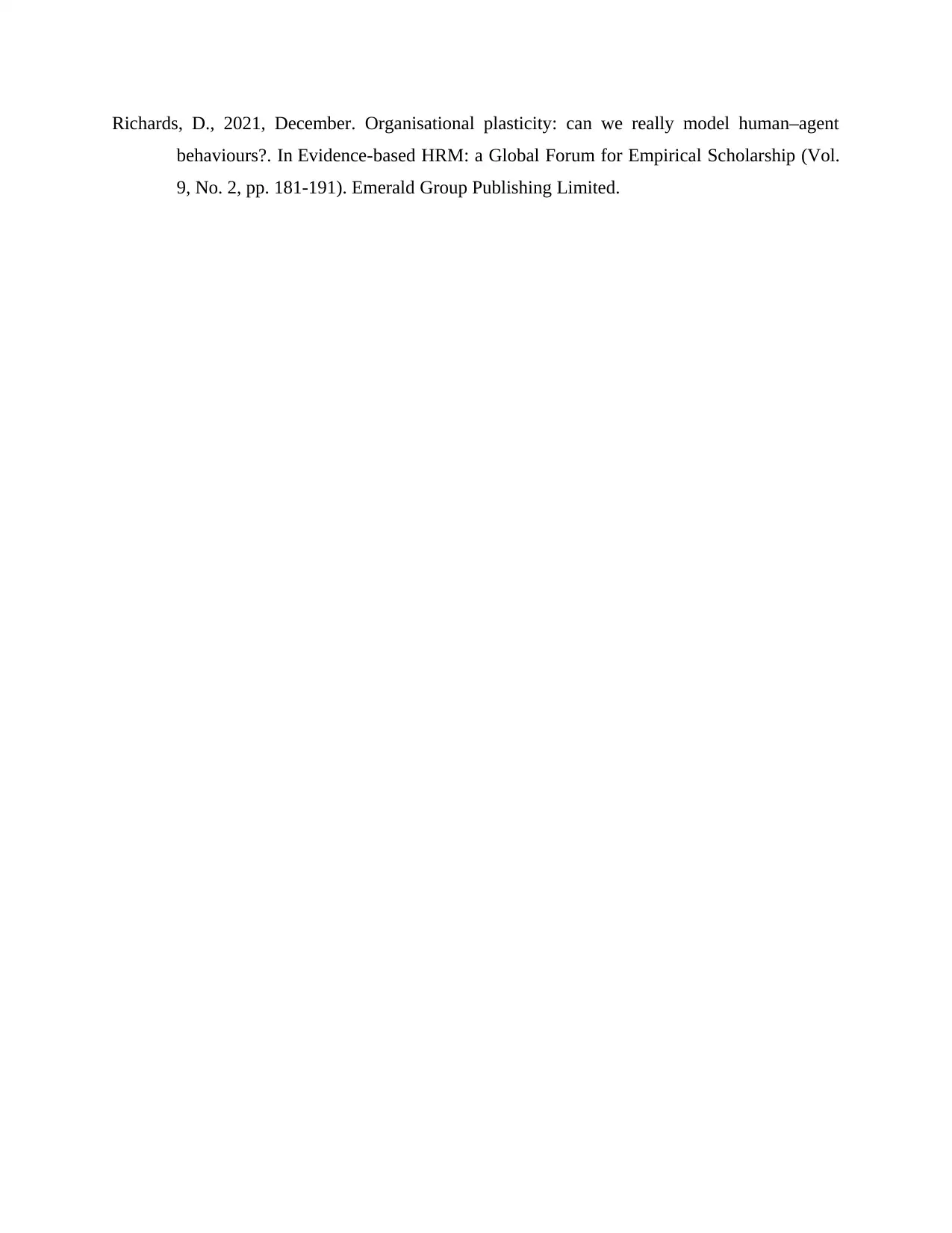
Richards, D., 2021, December. Organisational plasticity: can we really model human–agent
behaviours?. In Evidence-based HRM: a Global Forum for Empirical Scholarship (Vol.
9, No. 2, pp. 181-191). Emerald Group Publishing Limited.
behaviours?. In Evidence-based HRM: a Global Forum for Empirical Scholarship (Vol.
9, No. 2, pp. 181-191). Emerald Group Publishing Limited.

⊘ This is a preview!⊘
Do you want full access?
Subscribe today to unlock all pages.

Trusted by 1+ million students worldwide
1 out of 13
Related Documents
Your All-in-One AI-Powered Toolkit for Academic Success.
+13062052269
info@desklib.com
Available 24*7 on WhatsApp / Email
![[object Object]](/_next/static/media/star-bottom.7253800d.svg)
Unlock your academic potential
Copyright © 2020–2026 A2Z Services. All Rights Reserved. Developed and managed by ZUCOL.





